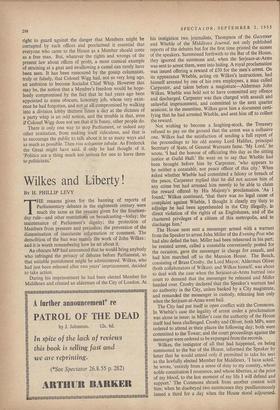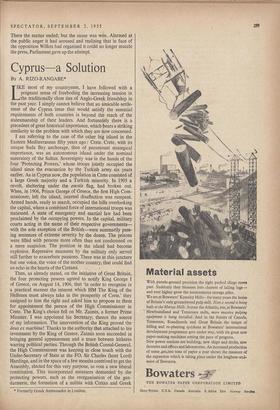Wilkes and Liberty !
BY H. PHILLIP LEVY THE reasons given for the banning of reports of Parliamentary debates in the eighteenth century were much the same as the reasons given for the fourteen- day rule—and other restrictions on broadcasting—today; the maintenance of Parliament's dignity; the protection of Members from pressure and prejudice; the prevention of the dissemination of inaccurate information or comment. The demolition of the ban was mainly the work of John Wilkes : and it is worth remembering how he set about it.
An obscure MP had announced that he would bring anybody who infringed the privacy of debates before Parliament, so that suitable punishment might be administered. Wilkes, who had just been released after two years' imprisonment, decided to take action.
During his imprisonment he had been elected Member for Middlesex and deated an alderman of the City of London. At his instigation two journalists. Thompson of the Gazetteer and Wheble of the Middlesex Journal, not only published reports of the debates but for the first time printed the names of the speakers. Summoned forthwith to the Bar of the House, they ignored the summons and, when the Serjeant-at-Arms was sent to arrest them, went into hiding. A royal proclamation was issued offering a reward of £50 for the men's arrest. On its appearance Wheble, acting on Wilkes's instructions, had himself arrested by one of his own employees, a man called Carpenter, and taken before a magistrate—Alderman John Wilkes. Wheble was held not to have committed any offence and discharged. Carpenter was then charged with assault and unlawful imprisonment, and committed to the next quarter sessions; in the meantime. Wilkes gave him a document certi- fying that he had arrested Wheble, and sent him off to collect the reward.
Not wishing to become a laughing-stock, the Treasury refused to pay on the ground that the arrest was a collusive one. Wilkes had the satisfaction of sending a full report of the proceedings to his old enemy Lord Halifax, principal Secretary of State, of General Warrants fame. 'My Lord,' he wrote, 'I had the honour of officiating this day as the sitting justice at Guild Hall.' He went on to say that Wheble had been brought before him by Carpenter, 'who appears to be neither a constable, nor peace officer of this city.' When asked whether Wheble had committed a felony or breach of the peace, Carpenter replied that he did not accuse him of any crime but had arrested him merely to be able to claim the reward offered by His Majesty's proclamation. 'As I found,' Wilkes continued, 'that there was no legal cause of complaint against Wheble, I thought it clearly my 'duty to adjudge he had been apprehended in the City illegally, in direct violation of the rights of an Englishman, and of the chartered privileges of a citizen of this metropolis, and to discharge him.'
The House next sent a messenger armed with a warrant from the Speaker to arrest John Miller of the Evening Post who had also defied the ban. Miller had been rehearsed in his part; he resisted arrest, called a constable conveniently posted for the occasion, gave the messenger in charge for assault, and had him marched off to the Mansion House. The Bench, consisting of Brass Crosby, the Lord Mayor; Alderman Oliver (both collaborators of Wilkes); and Wilkes himself, was about to deal with the case when the Serjeant-at-Arms hurried into court to demand that the messenger be released and -Miller handed over. Crosby declared that the Speaker's warrant had no authority in the City, unless backed by a City magistrate, and remanded the messenger in custody, releasing him only when the Serjeant-at-Arms went bail.
The City had put itself in open conflict with the Commons. In Wheble's case the legality of arrest under a proclamation was alone in issue; in Miller's case the authority of the House itself had been challenged. Crosby and Oliver, both MPs, were ordered to attend in their places the following day; both were committed to the Tower; and the court proceedings against the messenger were ordered to be expunged from the records.
Wilkes, the instigator of all that had happened, on being summoned to the bar of the House, informed the Speaker by letter that he would attend only if permitted to take his seat as the lawfully elected Member for Middlesex. 'I have acted,' he wrote, 'entirely from a sense of duty to my country, whose noble constitution I reverence, and whose liberties, at the price of my blood, to the last moment of my life I will defend and support.' The Commons shrank from another contest with him; when he disobeyed two summonses they pusillanimously issued a third for a day when the House stood adjourned. There the matter ended; but the cause was won. Alarmed at the public anger it had aroused and realising that in face of the opposition Wilkes had organised it could no longer muzzle the press, Parliament gave up the attempt.



































 Previous page
Previous page